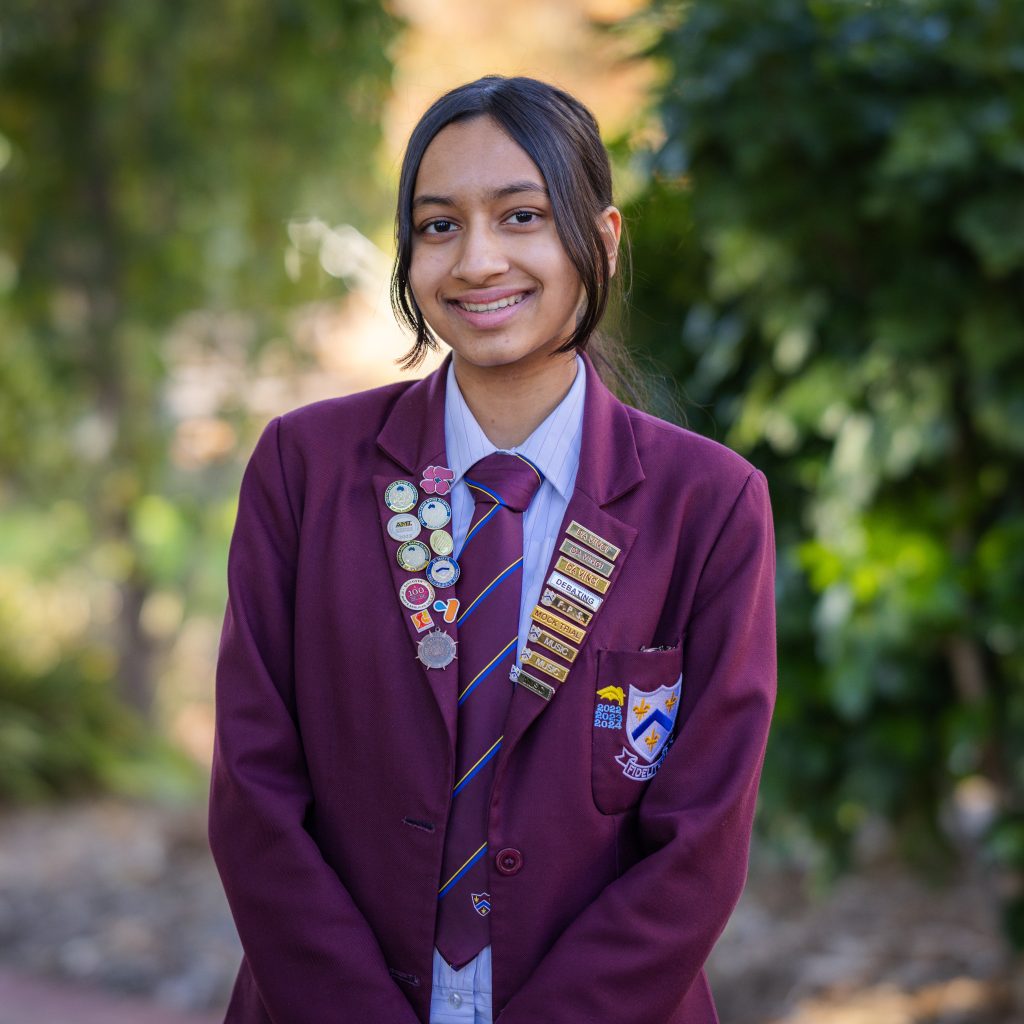Alisha wins Laura Literary Award
POSTED August 7 2025 , News, Academic, Senior School
Year 10 student Alisha has won the Young Adult Prose category of the Laura Literary Awards, a long-running national writing competition.
Students from St Mary’s have won this competition two of the last three years. You can read about our past winners here.
Written as part of her extension English class, Alisha’s thoughtful and imaginative interpretation of classical literature stood out. For this task, students were required to choose an underworld story or character and present an adaptation.
Alisha’s powerful piece, ‘The First Steps Forward’, is a re-imagining of Book 6 of the Aeneid in which she journeys to India, finding the souls of her ancestors along the banks of the river Ganges.
You can read Alisha’s piece below.

The First Steps Forward
A gentle breeze caressed my cheeks, the scent of jasmine lingering in the humid air. A stillness settled around me, broken only by the rhythmic movement of the current.
I stood two steps away from the Ganges River.
Two steps away from my heritage.
I had made it to India.
I thought back to my arrival at New Delhi’s International Airport. The rush of cool air inside the terminal had quickly given way to intense humidity outside. I was standing on the land that formed half of who I was, the ancestral homeland of my grandfather’s stories. Yet, beyond the chaotic roads, Bollywood billboards, and unfamiliar languages, I felt like an outsider. This place wasn’t home. Australia was.
Sure, I had brown skin, dark eyes, and frizzy, jet-black hair. But beyond those traits, could I truly call myself Indian? Growing up in a multicultural, immigrant family, we didn’t follow traditions. I wasn’t Hindu, didn’t speak Hindi, and never celebrated Indian festivals. My only connection to India had been through Tata, my grandfather. Though he didn’t speak English, he shared stories of India with reverence. With him, I never needed to prove anything. Life without him had been incredibly hard. He wore a ring, a small symbol of his past, and now it rested in my pocket, an anchor to a history I didn’t understand. Amid my life in Australia, I often felt my culture slipping through my fingers, despite how hard I tried to keep up.
Not Australian enough.
Not Indian at all.
And so, here I was, two steps from the Ganges, suspended between uncertainty and self-discovery. I took a deep breath, recalling Tata’s words about the river’s power to cleanse. I needed that clarity. I was searching for answers, hoping to rediscover a part of myself that felt lost.
As I approached the water, a creeping sense of presence stirred the air. I wasn’t alone.
A frail man stood beside a bamboo raft, eyes fixed on the water. He wore a dhoti, his head wrapped in a scarf. A Guru.
“I need to cross,” I said, my voice coarser than expected.
He didn’t move.
“You do not hold the pass.”
A pass? I fumbled through my pockets, pulling out only my iPhone. Then my fingers brushed against something familiar. The ring. I knew it was an heirloom, passed down through generations, but it had never felt as significant as it did now.
With trembling hands, I held it out.
“Would this be acceptable?”
The Guru studied it, then silently nudged the raft into the water, an invitation. My fingers tightened around the ring as I slipped it onto my finger, its warmth reassuring.
The raft floated into a dense mist. The water shimmered like scattered diamonds, but the world around me seemed distant. It was just the Guru, the water, and me. But as we drifted forward, a figure began to emerge.
An old woman, draped in a faded sari, stood ahead. Her gaze pierced me, eyes carrying generations of wisdom.
“You seek answers?” she harshly scoffed. “You grew up where you could choose what to hold onto. How can you claim a heritage you’ve turned away from?”
Her voice stung. I bristled, but deep down I knew there was truth in her words. In Australia, I could choose who I wanted to be, including which parts of my culture I discarded.
“I never abandoned it,” I croaked. “That’s why I’m here.”
She cast me one final, pointed look, before vanishing into the mist. But just before disappearing, I caught a glint on her finger: a ring, identical to Tata’s.
Who was she to me? Before I could dwell on it, another figure emerged: a girl my age, wearing a simple salwar kameez.
“You have choice,” she said. “You are lucky.”
I almost laughed. Lucky? I’d spent my whole life torn between two cultures, failing to belong anywhere.
“I don’t feel lucky,” I admitted.
“I was married at fourteen, had children by sixteen. I never had a voice, yet you struggle to embrace the heritage I wasn’t allowed to leave behind,” she replied.
Her words silenced me. All my life I hated having to choose between being Indian and Australian, but at least I had the freedom to choose. Some people didn’t. She, too, disappeared, but her words lingered. The raft carried us deeper, approaching an imposing presence.
The Guru peered ahead. “We’re here.”
The mist cleared to reveal a strange landscape. Still India, but surreal. The trees bent low, the sky swirling with muted colours. Everything felt dreamlike. I stepped off the raft, alone. Drawn forward, I found a vibrant mahogany tree, starkly contrasting to its dull surroundings. Beneath it, a stooped figure turned. I froze, tears welling in my eyes.
“Tata?” I whispered, rushing to embrace him, but my arms passed through his body, as if he were ethereal, a shade. I failed twice more.
He smiled, eyes warm and knowing. His gaze dropped to the ring on my finger.
“This has been passed down through generations,” he spoke tenderly. “A link between past and present.”
I blinked, startled. I could understand him perfectly. No language barrier. It was as if he were speaking perfect English.
“You don’t have to prove your heritage, Sha,” he said gently. “It’s already within you. It lives in your values, your heart, not your clothes or language.”
Overwhelmed, tears spilled down my cheeks. I thought of the times I’d sat with him, my father translating. Now, I understood every word, and that connection felt profound and familiar.
Tata beckoned me. “Come and see.”
We walked past the mahogany tree into a lush space where flowers bloomed and dew glistened. Through the mist ahead, a procession took shape.
“This is the future of our people,” Tata said.
A first group appeared: men in dhotis, women in bright saris, children in colourful traditional outfits. They embodied the image of Indian culture I could never fit into. Then came another group. Indian too, but in jeans, T-shirts, sneakers. Relaxed, casual, lacking the poise and deference of the first group. They were just like me. But despite their differences, both groups walked together, united by one force: their culture.
And that’s when something clicked.
I was part of that procession. I was the legacy of this country, of my continuing culture, of Tata. The people who carried my culture included everyone with a connection to my heritage, not just the ones I thought were ‘truly Indian’. It was never about what I looked like, dressed like, or acted like. My culture had always been in me.
I turned to Tata, heart brimming with clarity. I embraced the moment, a gentle smile across his face. Then he spoke once more.
“Now go.”
I was at the river again, but this time not two steps away. I stood at the banks, gazing into the shimmering water, reflecting faces of my ancestors, my people. And while I’d return to Australia, I’d never again feel torn between two steps, two identities, two worlds.
This time, I had truly understood what it meant to belong, and this was the first step into my new chapter.





